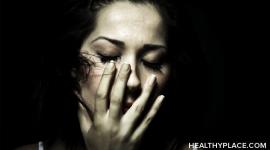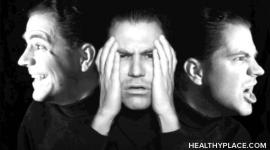Bipolar Depression and Unipolar Depression: Is There A Difference?

Detailed info on the difference between bipolar depression and unipolar depression and the importance of having a correct diagnosis of bipolar disorder.
What is the difference between bipolar depression and unipolar depression?
Bipolar depression is the depressive phase of bipolar disorder. It may alternate with mania or hypomania. It can also occur at the same time as mania in a mixed episode.
There is one set of symptoms for depressive episodes. These may occur in bipolar disorder or major depressive disorder (unipolar depression). Each person's experience is a little bit different. Researchers have studied possible differences in symptoms of bipolar and unipolar depression.
With bipolar depression, people are more likely to have symptoms like feelings of worthlessness and loss of interest. They may also have increased sleep and appetite, and feel slowed down. There might be psychotic symptoms such as delusions or hallucinations. Bipolar depression is thought to have a higher risk of suicidal thoughts and attempts. Unipolar depression is more likely to include anxiety, tearfulness, insomnia and loss of appetite. It is not always easy for the person who has depressive symptoms to identify and describe them.
More than half of people with bipolar disorder experience depression before they experience mania. Doctors often recommend starting treatment with a mood stabilizer instead of an antidepressant if a person might have bipolar disorder.
Researchers believe that with bipolar disorder, depressive symptoms are more likely than manic symptoms to continue at a low level and interfere with life. Symptoms must be carefully monitored and treated to complete recovery. People with bipolar I disorder (alternating depression and mania) often have depression three times as often as they have mania. With bipolar II disorder, (alternating depression and hypomania) people may not have recognizable or disabling mania at all.
Because of the difficulty in diagnosing bipolar II disorder, researchers believe bipolar illness is much more common that we once thought. Nearly seven out of ten people with bipolar disorder are misdiagnosed. The most common initial misdiagnosis is depression.
If you have symptoms of depression and are unsure whether you have unipolar or bipolar disorder, talk about it with your doctor. Examine your family history. Write down your symptoms so you don't forget them. Tell your doctor all of the symptoms you've had. Be sure to mention symptoms you don't have at the time of your appointment. These may include racing thoughts, high energy, less sleep, irritability, or risktaking. Correct diagnosis of bipolar disorder is important to getting the right treatment and preventing future depression or mania.
Psychotherapy is also a helpful treatment for depression or bipolar disorder. Talk therapy can help you cope with symptoms and develop a healthy lifestyle. It can also help you avoid things that could trigger future depressive or manic episodes.
APA Reference
Tracy, N.
(2022, January 3). Bipolar Depression and Unipolar Depression: Is There A Difference?, HealthyPlace. Retrieved
on 2026, January 13 from https://www.healthyplace.com/depression/bipolar/bipolar-depression-and-unipolar-depression-is-there-a-difference



